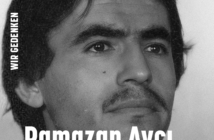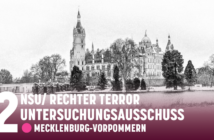The unexpected reading of the indictments in the afternoon of today’s hearing is an urgent, necessary break. After the bickering around the press-accreditation process, after the hours long reading of motions from the lawyers of Zschäpe and Wohlleben on the first and initially on the second sessions of the trial, for the first time the deeds of the NSU were again the focus. And as a side note, the Presiding Judge Götzl had indicated, that with an increase in the number of co-plaintiffs in the case of Keupstraße, it could be separated from the current proceedings.
In the audience Neo-Nazis attracted attention to themselves again on the second day of the proceedings of the NSU-Trail. This time Maik E, the twin brother of the accused André E. had already managed to come into the room by the beginning of the day’s proceedings. He had already lined up at the court by around 6:30 a.m. He arrived together with the Daniel Thönnessen, who was already convicted of crimes with explosives with the since banned group Camaraderie Aachen Land (KAL). Thönnessen now lives in Munich. When the defendants G., S., and E. come into the hall, it is noticeable, that the two brothers appear today dressed like twins. Maik E. and André E wear leather jackets, carpenter pants and black shirts with white letters of the band AC/DC. The outfit is probably no coincidence: the lightning character between the two components of the band’s name is similar to a Sig-Rune. Multiple times Maik makes eye contact with his accused brother, and also with the defendants Ralf Wohlleben and Nicole Schneiders.
At 9:45 the two imprisoned defendants Ralf Wohlleben and Beate Zschäpe enter the hall. After the photographers and camera crews that are present take their pictures, the Senate enters the hall at 9:50.
The Presiding Judge Götzl will first establish attendance. Meanwhile, co-plaintiff lawyer Thomas Bliwier asks that after the attendance he will be immediately granted the floor. However, first, attorney Heer, defense lawyer for Zschäpe, seizes the floor. He recalls that he had announced at the end of the first day of the trial that he had further motions to file and that he was, at the beginning of today’s session, to be immediately granted the floor. This refers specifically to Bliwier, who then claims that Heer at the end of the previous day’s proceedings had announced no further urgent motions to file. Due to this, the court is now required to ensure that the charges will be read as soon as possible. This contradicts attorney Heer. His motion is concerned with the claim that the room A 101 is not suitable for orderly trial proceedings to be carried out. Also Wohlleben’s attorneys announce motions, namely a motion for suspension and an adjustment application. A debate ensues between attorney Heer and Götzl, in which it comes down to how and to whom the floor is given as the court must deal with Heer’s motions. Then Götzl gives attorney Bliwier the floor. Bliwier reads his statement: The motions of the defense are anything but urgent, and could be postponed until after the reading of the indictment. It is out and out clear: Mr. Wohlleben’s defense would like to prevent the reading of the indictment. Attorney Klemke, defense lawyer of Wohlleben, asks for a fifteen-minute recess so he could read the motion to himself. Klemke defends himself against the allegations raised by Bliwier. The ancillary suit was about the silencing the defense “apparently not enough pieces of the chancellery have been thrown.” At the firm of Klemke’s in Cottbuss the windows had already been smashed. The representatives of the Attorney General close the motion to read the indictment. State prosecutor Diemer: “The ingenuity of the defense is apparently inexhaustible.”
At 10:20 am Götzl interrupts the proceedings for the first time, and calls a recess. During the recess Ralf Wohlleben is quickly treated for “medical problems” (Schneiders), but quickly comes back into the room.
Shortly after 11a.m. the trail goes on. Götzl granted Heer the floor so that he could read his motion. He sought to suspend the trail and to resume in a hall “with more spatial capacity and one reasonable for the importance of the proceedings.” Alternatively he requested, among other things, that the trial be stopped for at least two days to receive and inspect all the files for the second accreditation process.
The rational of Heer alleges is that the room is too small to include the general public. Instead of a venue in Munich they could have decided to hold it at the former Budestag in Bonn, today the World Conference Center. From the gallery the hall is not adequately visible. The hall would only remain suitable if more plaintiffs were not coming, this however is not foreseeable. The witnesses cannot be seen from everywhere. In particular the “non-verbal emotions” of the witnesses will not be perceived for the ancillary suit. The original plan was to project each person speaking onto the walls for better visibility. But support of that has currently been completely abandoned. Instead parts of the court (the Judges) can read their defense documents from their desk. Furthermore Heer requests access to the records of the second accreditation process, this also has clearly been a mistake. This access was grated to the defenders, although Heer has obviously not found the time to see the files.
Subsequently, a long dispute developed about the request. Council for the ancillary suit Attorney Scharmer notes, that initially he indeed thought the space was too small, but “for my client it is more important that the proceedings begin now.” After all, now there are only seven co-plaintiffs personally present. Schneider joins for Wohlleben the motion of Zschäpe’s defense team.
At 11:50 the hearing adjourned for lunch.
After the break, around 1:40 p.m. representative of the co-planitiff Attorney Mohommand took up the request of Heer saying, “It imposes the suspicion of an intent to delay the trial.” Götzl now considers ways to solve the problems raised by Heer quickly. The two judges concerned had assured, that they have no knowledge of Heer’s files, and if in doubt Heer could for example, be put on the bench behind him next to attorney Schneiders seat. Herr: “I will certainly not go to the children’s table.” The following for today’s proceedings is typical of the conflicts between Götzl and Heer, this time by the use of the term “children’s table” and also again about who currently has the floor and who interrupted whom. Götzl then asks the co-plaintiff’s if there were objections to the enlarged projections of each speaker into the next room. The co-plaintiffs present and most of the ancillary suit representatives agree to this, but they cannot speak in all cases for their clientele. From this point on, it’s decided that the people speaking will be projected onto the screens.
Then followed comments of the state prosecution and some representatives of the co-plaintiffs on the motion of Heer. At 2:15pm Götzl calls another recess. After the recess he announces that the Senate denies Heer’s request. The public is sufficiently ensured (in this venue.) The suspension of the trial is also denied. A “vote on further procedural actions” requires a transcript of the decision of the court and another recess is called until 2:30 pm.
After the recess, Heer responds with a remonstrance against the announced decision. Claiming the decision was not justified. Therefore he requested a further recess. His colleague Stahl again goes back to the number of co-plaintiffs, mainly from the situation regarding the nail bomb attack in the Keupstraße. It is to be expected that “if 30 to 60 co-plaintiffs join the case, that the room capacity here would no longer be sustainable.”
Heer still wants to, at least, make a further request for the stay of the proceedings, regarding the appointment of the representatives of the state prosecution. After a short verbal battle and a subsequent pause for consultation, on the order of the presiding judge lawyer Heer will not be issued the floor, the Senate also confirms this. From the stand Götzl begins questioning the accused according to the particulars of the person. The first addressed, Beate Zschäpe, does not answer him. Heer jumps in saying “my client will not answer the personal details.” So Götzl reads the particulars from the claim. André E. is also tight-lipped. After confirmation of name, marital status and place of residence, he says in a broad Saxon accent “I will not say anything more.” Götzl does not question the other defendants; rather he just reads the information from the claim as confirmation.
At 3:37 pm Federal Prosecuter Dr. Diemer finally starts reading the charges. For the first time the deeds of the NSU and their supporters, the defendants Wohlleben, G., S. and E., are read in the proceedings. Diemer gives the names of the victims and openly lays out the brutality of the murders. Not only are the public and the co-plaintiffs quiet, even the accused in noticeably quieter.
Götzl points out after providing of the charges, that the nail bomb attack in Keupstraße could be seen as an additional 31 counts of attempted murder. Heer requests a recess, and it is granted until 3:10pm.
After the pause, Götzl adds on a side note that, in any event, it’s arguable, “a significant increase in the number of co-plaintiffs is only to be expected when concerning the Keupstraße attack. At any rate, separating the Keupstraße case into a different trail is something to think about, and to take up tomorrow.”
This was followed by another hour of tenacious discussion on the appointments of the court first by Wohlleben’s attorney Klemke and then by Zschäpes attorney Sturm. It was about the fact that Judge Fischer was appointed temporarily to the Federal Court. Therefore Judge Peter Preschl is named assistant Judge, although Mr. Hertel would have to move up according to Klemke. Sturm complained, among other things, that the there was no documentation of the board meeting where the appointment was decided.
After statements of the co-plaintiffs on the appointments of the court the proceedings ended at 6:10pm.


